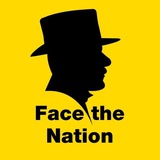The idea to build a metro in Moscow first came at the end of the XIX century, and in 1875 was announced an idea to build a line from the Kurskiy railway stationvia the Lubyanka and Pushkinskaya Square to Maryina roscha. But this project wasn't realised, mostly because ofthe church opposition. Here is what one of the metropolitan bishops wrote to Moscow Metropolitan Innocent: "Is it possible to prevent this very sinful dream? Will not humiliate himself a man created in the image and likeness of God, who will descend into hell?"
The Soviet government did not want to get behind the main world's capitalist powers and start to think about the construction of subway in Moscow from the very 1917. The first project was commissioned in 1921 by the German company Siemens, in 1926 project was ready and it included construction 80 new metro stations. But government had no money, and the project remained on paper.
@facethenation
The Soviet government did not want to get behind the main world's capitalist powers and start to think about the construction of subway in Moscow from the very 1917. The first project was commissioned in 1921 by the German company Siemens, in 1926 project was ready and it included construction 80 new metro stations. But government had no money, and the project remained on paper.
@facethenation
🚇 The first line of the Moscow metro was opened on May 15, 1935 and laid from station "Sokolniki" to "Park Kultury" with a branch to the "Smolenskaya" @facethenation
Moscow metro system was first opened in 1935 with the line of 11 kilometers and 13 stations @facethenation
Amsterdam 1928 Olympic Games, athletic festival held in Amsterdam, that took place May 17 - August 12, 1928. The Amsterdam Games were the 9th occurrence of the modern Olympic Games.
http://telegra.ph/Amsterdam-1928-Summer-Olympics-05-17
http://telegra.ph/Amsterdam-1928-Summer-Olympics-05-17
Telegraph
Amsterdam 1928 Summer Olympics
The 1928 Summer Olympics, held in Amsterdam, Netherlands, was the first to feature the lighting of the Olympic flame.
Coin toss between Turkey national football team and Egypt before the Summer Olympics match ⚽ on May, 1928 @facethenation
On May 18, 1969, Apollo 10 launched from NASA’s Kennedy Space Center. It was the first flight of a complete, crewed Apollo spacecraft to operate in lunar orbit @facethenation
Apollo 10 transmit the first color pictures of Earth over the Moon @facethenation
Charles Lindbergh completed the first solo flight across the Atlantic Ocean (from New York 🇺🇸 to Paris 🇫🇷) on May 21, 1927 @facethenation
Argentinian forces invaded the British overseas territory of the Falkland Islands on April 2, 1982.
Argentina had claimed sovereignty over the islands for many years and their ruling military junta did not believe that Britain would attempt to regain the islands by force.
Despite the huge distance involved - the Falklands were 8000 miles away in the South Atlantic - Britain, under the leadership of Margaret Thatcher, undertook the extraordinary feat of assembling and sending a task force of warships and rapidly refitted merchant ships to the Falklands.
The task force reached the Falklands in early May. On May 2, the Royal Navy submarine HMS Conqueror sank the Argentinian cruiser General Belgrano, with the loss of over 300 of her crew. After this incident, Argentinian ships remained in port.
However, the Argentinian airforce still posed a significant threat. The Royal Navy lost several warships to attacks from Argentinian aircraft, which were armed with missiles. Its Fleet Auxiliary ships were attacked at Fitzroy and the supply ship Atlantic Conveyor was also sunk.
British forces landed on the islands on May 21. After a series of engagements against a well dug-in but ill-trained conscripted Argentinian Army, they began the battle for Stanley, the islands’ capital on June 11.
Argentinian forces surrendered on June 14, 1982.
@facethenation
Argentina had claimed sovereignty over the islands for many years and their ruling military junta did not believe that Britain would attempt to regain the islands by force.
Despite the huge distance involved - the Falklands were 8000 miles away in the South Atlantic - Britain, under the leadership of Margaret Thatcher, undertook the extraordinary feat of assembling and sending a task force of warships and rapidly refitted merchant ships to the Falklands.
The task force reached the Falklands in early May. On May 2, the Royal Navy submarine HMS Conqueror sank the Argentinian cruiser General Belgrano, with the loss of over 300 of her crew. After this incident, Argentinian ships remained in port.
However, the Argentinian airforce still posed a significant threat. The Royal Navy lost several warships to attacks from Argentinian aircraft, which were armed with missiles. Its Fleet Auxiliary ships were attacked at Fitzroy and the supply ship Atlantic Conveyor was also sunk.
British forces landed on the islands on May 21. After a series of engagements against a well dug-in but ill-trained conscripted Argentinian Army, they began the battle for Stanley, the islands’ capital on June 11.
Argentinian forces surrendered on June 14, 1982.
@facethenation
British frigate HMS Antelope explodes 💥 in San Carlos Water, off East Falkland, after attacks by the Argentine Air Force during the Falklands War, May 24, 1982 @facethenation
